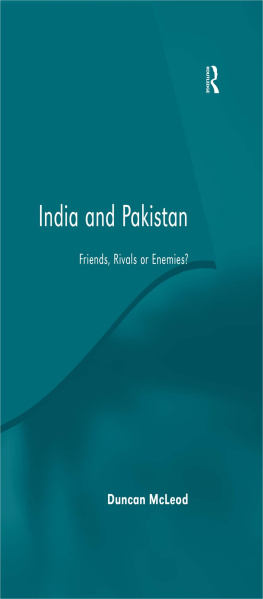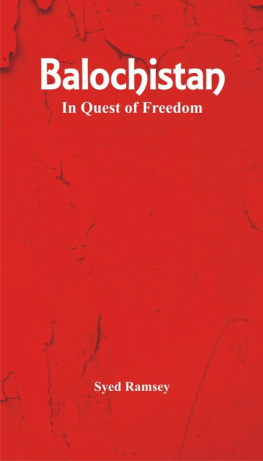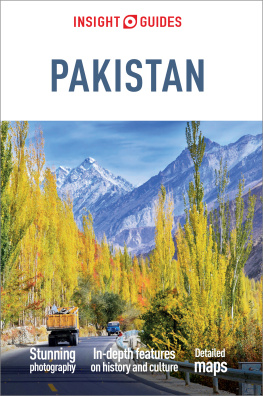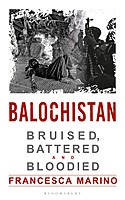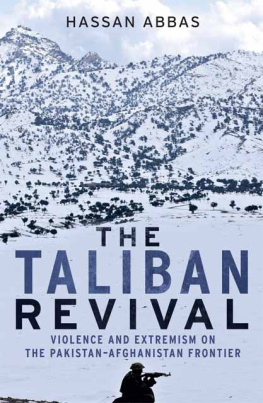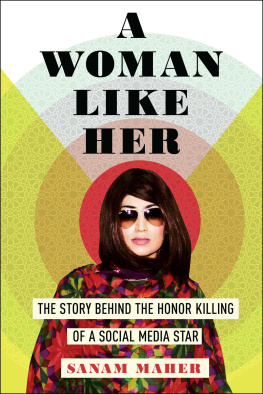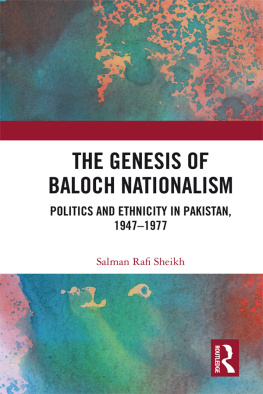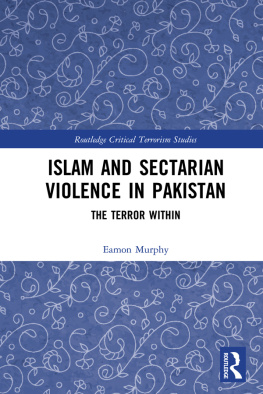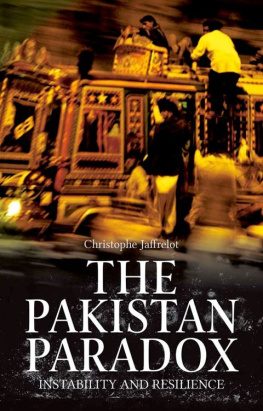
Ethno-political Conflict in Pakistan
This book critically examines the causes of the increase in insurgent violence in Balochistan and explores the relations between the national government of Pakistan and the province of Balochistan.
Based on historical analysis, the book argues that the national government of Pakistan and the leaders of Balochistan both use a standard narrative when dealing with each other. According to the Baloch narrative, Islamabad exploits Balochistans natural resources without giving Balochistan its due share and has never accepted and granted Balochistan equal rights. The centres narrative emphasizes the tribal character of the Baloch society and suggests that the Baloch elite hinder Balochistans integration with the federation. This book demonstrates that both narratives are inherently flawed and presents a precipitous picture of the problem of insurgent violence. It also shows that the Baloch leadership is divided along tribal lines and lacks a unified voice and proposes that the Baloch elite use the narrative of enduring injustice only as a source of politicization of Baloch ethnicity when an actual or perceived injustice is taking place.
An important addition to the literature on ethno-political conflicts, this unique analysis of the importance of narrative in the imagination of political movements will be of interest to scholars in the fields of South Asian studies, ethnic conflicts, separatist and political movements and Asian politics.
Rizwan Zeb is an Associate Professor and Chair in the Department of Social Sciences at Iqra University, Islamabad, Pakistan.
Routledge Advances in South Asian Studies
Series Editors
Subrata K. Mitra, Heidelberg University, Germany Rani Mullen, College of William and Mary, USA
South Asia, with its burgeoning, ethnically diverse population, soaring economies, and nuclear weapons, is an increasingly important region in the global context. The series, which builds on this complex, dynamic and volatile area, features innovative and original research on the region as a whole or on the countries. Its scope extends to scholarly works drawing on history, politics, development studies, sociology and economics of individual countries from the region as well those that take an interdisciplinary and comparative approach to the area as a whole or to a comparison of two or more countries from this region. In terms of theory and method, rather than basing itself on any one orthodoxy, the series draws broadly on the insights germane to area studies, as well as the tool kit of the social sciences in general, emphasizing comparison, the analysis of the structure and processes, and the application of qualitative and quantitative methods. The series welcomes submissions from established authors in the field as well as from young authors who have recently completed their doctoral dissertations.
Indigenous Identity in South Asia
Making Claims in the Colonial Chittagong Hill Tracts
Tamina M. Chowdhury
Gender justice and proportionality in India
Comparative perspectives
Juliette Gregory Duara
Governance and Development in India
A Comparative Study on Andhra Pradesh and Bihar After Liberalization
Seyed Hossein Zarhani
Ethno-political Conflict in Pakistan
The Baloch Movement
Rizwan Zeb
For a full list of titles, please see: www.routledge.com/asianstudies/series/RASAS
Ethno-political Conflict in Pakistan
The Baloch Movement
Rizwan Zeb
First published 2020
by Routledge
2 Park Square, Milton Park, Abingdon, Oxon OX14 4RN
and by Routledge
52 Vanderbilt Avenue, New York, NY 10017
Routledge is an imprint of the Taylor & Francis Group, an informa business
2020 Rizwan Zeb
The right of Rizwan Zeb to be identified as author of this work has been asserted by him in accordance with sections 77 and 78 of the Copyright, Designs and Patents Act 1988.
All rights reserved. No part of this book may be reprinted or reproduced or utilised in any form or by any electronic, mechanical, or other means, now known or hereafter invented, including photocopying and recording, or in any information storage or retrieval system, without permission in writing from the publishers.
Trademark notice : Product or corporate names may be trademarks or registered trademarks, and are used only for identification and explanation without intent to infringe.
British Library Cataloguing-in-Publication Data
A catalogue record for this book is available from the British Library
Library of Congress Cataloging-in-Publication Data
Names: Zeb, Rizwan, author.
Title: Ethno-political conflict in Pakistan : the Baloch movement / Rizwan Zeb.
Description: 1. | New York : Routledge, 2019. | Series: Routledge advances in South Asian studies | Includes bibliographical references and index.
Identifiers: LCCN 2019033098 (print) | LCCN 2019033099 (ebook) |
ISBN 9780367331450 (hardback) | ISBN 9780429318139 (ebook) |
ISBN 9781000729627 (adobe pdf) | ISBN 9781000729771 (mobi) | ISBN 9781000729924 (epub)
Subjects: LCSH: Balochistan (Pakistan)Politics and government. | Baluchi (Southwest Asian people)HistoryAutonomy and independence movements.| PakistanEthnic relations.
Classification: LCC DS392.B28 Z43 2019 (print) | LCC DS392.B28 (ebook) | DDC 954.91/505dc23
LC record available at https://lccn.loc.gov/2019033098
LC ebook record available at https://lccn.loc.gov/2019033099
ISBN: 978-0-367-33145-0 (hbk)
ISBN: 978-0-429-31813-9 (ebk)
To Ammi and Abu
This is for you
And
To Bushra, Huzaifa and Maryam
Contents
PART I
Baloch and Balochistan through history
PART II
CentreProvince (IslamabadBalochistan) relations post-independence
Now that this book is complete, I must confess that this remarkable research journey turned out to be my Ray Buduick story . Just like Ray Buduick, I could never have imagined what is in store for me in this journey. During this time, I had a number of experiences good as well as bad. What astonished me the most is that in my naivety, I always believed that in academia, one would never be libelled for questioning something, especially when one tries to do it to the best of ones ability with objectivity and providing detailed sources. Alas, I was proven wrong. My book is a critical analysis of the Baloch nationalist narrative. This implies that in it the flaws in the Baloch narrative will also be highlighted, and this is something that was unacceptable for many within the academic community, be it in Australia, Europe and elsewhere. For them, my research was driven by some ulterior motive. For this, I was accused of holding extremely conservative, derogatory positions and value judgements towards the Baloch society and leadership and that in my work, I was providing unconditional defence of the central states policies in Balochistan, under a variety of administrations and because of this, my work lacks credibility.
Fortunately for me, there were many who held a different view about me and my work. I was fortunate enough to have found such people who not necessarily agreeing to what I wrote helped, supported and guided me through this journey. First and foremost, I am grateful to Dr. Michael Azeriadis. He was always generous with his time and provided excellent feedback and guidance on how to write, rewrite and/or sharpen my argument.



